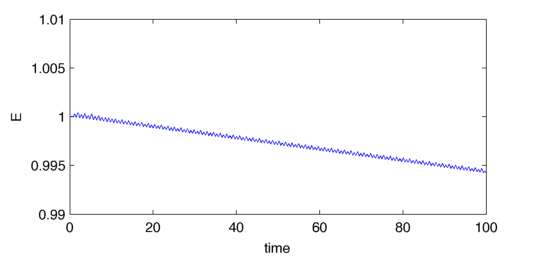Let us say we have the following equations:
dy1/dt = f(y1, t) [1]
dy2/dt = g(y2, t) [2]
The equations are such that they are "conservative", i.e. the following condition should hold:
dy1/dt + dy2/dt = 0 [3]
Using scipy.odeint, I find that I can integrate conservative equations like this just fine for simple systems of ODEs.
However, for larger ones, I get the following issue.
Let's say that this is my derivative function:
def deriv_function(y0s, t):
...body defines equations 1, and 2...
print np.sum(ode)
return ode
Note the print statement.
I use scipy.odeint on deriv_function as follows:
odeint(deriv_fun, y0s, [0, 0.5])
Due to the print statement, the following gets printed out:
-1.38555833473e-13 <--- note, close to zero
-0.00679107743937
-0.0067907211796
-0.0135814423985
-0.0135810861584
-0.416522145214
-0.416523165887
-0.818209018574
-0.818211056221
-1.21864678558
-1.21864881584
-2.86735888212
-2.8673729885
-2.46855840934
-2.46856658088
-3.70632102566
-3.70631206163
-4.93200749506
-4.93200691488
-6.14577326158
-6.14577268283
-8.53799987128
-8.53799713959
-10.8839304356
-10.8839320212
-13.1845005689
-13.1845021725
-15.4406122011
-15.4406123927
-17.6531469917
-17.653147185
-24.6238415795
-24.6238498033
-31.1628867985
-31.1628947266
-37.2974784594
-37.2974547092
-35.463527103
-35.4635192949
-39.5777426955
-39.5777472677
-43.5137135424
-43.5137108017
-47.2791485087
-47.2791483993
-50.881424906
-50.8814244751
-54.3275507164
-54.3275502654 <--- note, not close to zero
For smaller systems of equations (not the same), the following gets printed out:
-1.13686837722e-13
0.0
0.0
0.0
-1.13686837722e-13
1.13686837722e-13
0.0
0.0
0.0
0.0
0.0
0.0
0.0
-1.13686837722e-13
0.0
0.0
0.0
1.13686837722e-13
0.0
0.0
0.0
0.0
-1.13686837722e-13
0.0
0.0
-1.13686837722e-13
0.0
0.0
0.0
0.0
0.0
0.0
-1.13686837722e-13
0.0
0.0
5.68434188608e-14
-5.68434188608e-14
-5.68434188608e-14
0.0
I have spent a lot of time trying to figure out if the issue has something to do with the way I have defined the equations, and I am now fairly certain that this is not the case. In order to confirm this, I would like to ask: is it possible at all for a non-conservative system of equations to first print an ode sum that is close to zero, but later print values that are not close to zero?
Another way to think of the question: in the larger system of equations, the ode sum initial prints out to be approximately zero, before increasing. What could be happening in the bowels of the solver for this problem to be occurring?
